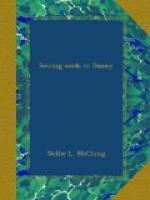Brandon hospital, August 10th.
Dear Mr. and Mrs. Motherwell: I know it will be at least some slight comfort for you to know that the poppies you sent Polly reached her in time to be the very greatest comfort to her. Her joy at seeing them and holding them in her hands would have been your reward if you could have seen it, and although she had been delirious up to that time for several days, the sight of the poppies seemed to call her mind back. She died very peacefully and happily at daybreak this morning. She was a sweet and lovable girl and we had all grown very fond of her, as I am sure you did, too.
May God abundantly bless you, dear Mr. and Mrs. Motherwell, for your kind thoughtfulness to this poor lonely girl. “Inasmuch as ye have done it unto the least of these, ye have done it unto Me.”
Yours cordially,
(Nurse) Agnes Hunt.
“By Jinks.”
Sam Motherwell took the letter from his wife’s hand and excitedly read it over to himself, going over each word with his blunt forefinger. He turned it over and examined the seal, he looked at the stamp and inside of the envelope, and failing to find any clue to the mystery he ejaculated again:
“By Jinks! What the deuce is this about poppies. Is that them things she sowed out there?”
His wife nodded.
“Well, who do you suppose sent them? Who would ever think of sending them?”
Mrs. Motherwell made no reply.
“It’s a blamed nice letter anyway,” he said, looking it over again, “I guess Polly didn’t give us a hard name to them up there in the ‘ospital, or we wouldn’t ha’ got a letter like this; and poor Polly’s dead. Well, she was a kind of a good-natured, willin’ thing too, and not too slow either.”
Mrs. Motherwell was still silent. She had not thought that Polly would die, she had always had great faith in the vitality of English people. “You can’t kill them,” she had often said; but now Polly was dead. She was sick, then, when she went around the house so strangely silent and flushed. Mrs. Motherwell’s memory went back with cruel distinctness—she had said things to Polly then that stung her now with a remorse that was new and terrible, and Polly had looked at her dazed and wondering, her big eyes flushed and pleading. Mrs. Motherwell remembered now that she had seen that look once before. She had helped Sam to kill a lamb once, and it came back to her now, how through it all, until the blow fell, the lamb had stood wondering, pleading, yet unflinching, and she had run sobbing away—and now Polly was dead—and those big eyes she had so often seen tearful, yet smiling, were closed and their tears forever wiped away.
That night she dreamed of Polly, confused, troubled dreams; now it was Polly’s mother who was dead, then it was her own mother, dead thirty years ago. Once she started violently and sat up. Someone had been singing— the echo of it was still in the room:




